The Rediff Special / N K Singh
Narasimha Rao obviously meant that the instructions
to get the documents
attested had come to him
from Prime Minister Rajiv Gandhi himself
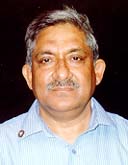 N K Singh is the CBI officer who arrested Indira Gandhi on October 3, 1977.
The first time a former Indian prime minister has gone to prison. Forced to return to his
home cadre in Orissa after she returned to power, this courageous and diligent Indian Police
Service officer was brought back to the CBI by V P Singh's government.
N K Singh is the CBI officer who arrested Indira Gandhi on October 3, 1977.
The first time a former Indian prime minister has gone to prison. Forced to return to his
home cadre in Orissa after she returned to power, this courageous and diligent Indian Police
Service officer was brought back to the CBI by V P Singh's government.
One of the first cases he was assigned was the St Kitts forgeries. Unfortunately, his meticulous
investigation into the case earned the wrath of the next prime minister, Chandra Shekhar,
who transferred him out of the agency.
In the final extract from his fascinating biography, The Plain Truth, N K
Singh exposes P V Narasimha Rao's role in the sordid affair.
Karan Singh, then the Indian ambassador to the US, told Sunday:' I quite frankly came to know this when somebody wrote to me. A
group of American Indians came to Washington and they had a press
conference saying this had happened. I called for the files and
for R.K. Rai, the counsel general. Then they showed me the consulate
manual, according to which if you put a signature, that doesn't
mean you are attesting the veracity of the documents. But I did
feel that it required a full investigation.
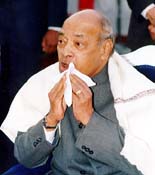 'Subsequently, after saying that I was sending all the documents
to Delhi, I discovered that Shri Narasimha Rao had, in fact, spoken
to Mr Rai. The matter is under investigation so I don't want
to prejudge it. But I did ask Rai then, when he didn't tell me
that the foreign minister had spoken to him about this. So he
looked rather sheepish and said that the foreign minister had
said specifically that he was not to tell me. In a way, I am glad
I knew nothing about it. It is a complex issue, but I must say
that prima facie I am not happy that this should have happened
because it gave the impression that there was an attempt to involve
this man Ajeya Singh. But in the absence of details......'
'Subsequently, after saying that I was sending all the documents
to Delhi, I discovered that Shri Narasimha Rao had, in fact, spoken
to Mr Rai. The matter is under investigation so I don't want
to prejudge it. But I did ask Rai then, when he didn't tell me
that the foreign minister had spoken to him about this. So he
looked rather sheepish and said that the foreign minister had
said specifically that he was not to tell me. In a way, I am glad
I knew nothing about it. It is a complex issue, but I must say
that prima facie I am not happy that this should have happened
because it gave the impression that there was an attempt to involve
this man Ajeya Singh. But in the absence of details......'
The telephone bills of Narasimha Rao during the period of his
stay in New York and that of Chandra Swami and others who were
also staying in New York during the same period confirmed telephonic
contact between Narasimha Rao and Khashoggi at 2306 hours on October
3, 1989 and 0942 hours on October 4, 1989. It was approximately
at 0942 hours that Rai had met Narasimha Rao in his hotel suite.
Much later, after he became prime minister, Narasimha Rao, during
an interview, published in the Indian Express of July 8, 1991,
given to its chief editor Prabhu Chawla, himself admitted to have
asked Rai to attest the documents. However, he added that he had
done it under the instructions of the 'highest authorities
in India.' The relevant extract from the interview is reproduced
below:
How do you explain your role in the St Kitts forgery relating
to former prime minister V P Singh's son, Ajeya Singh? Your name
is mentioned in the FIR as well.
I had made my position clear in my earlier statement. It is
like this. When I was in New York, I got a phone call from quarters
from where such a call would mean a direction to me saying that
an officer of the Enforcement Directorate was in New York. He was
investigating a case and had certain documents which were to be
authenticated urgently because they were needed for Parliament
purposes. I was told to see to it that there was no delay. This
was what I told the officer who was leaving the town the next
day.
How come you made calls to controversial people like Khashoggi?
No. My phones were used only by my private secretary and no
objectionable calls were made to anybody. I am not aware of the
person you are talking about.
But you seem to have a friendly relationship with Chandra Swami
against whom there are many cases pending in India?
I know the gentleman. He belongs to Hyderabad from where I
also come. That's about all. But if that is going to be made an
issue, I have nothing to add to it.
What about action against him? Some of your own MPs have demanded
action against him.
I would not either ask someone to do it immediately or ask
others to delay it. I am sure the law would take its own course.
Does the same apply to other cases like Bofors, Airbus, HDW
submarines?
Yes. I will not interfere in any of the cases. Investigations
are continuing.
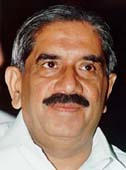 At the time when this happened in New York, Narasimha Rao was
a Cabinet minister in charge of external affairs. Obviously, a
Cabinet minister can get direction from none else than the prime
minister. He thus meant that the instructions to get the documents
attested had come to him from Prime Minister Rajiv Gandhi himself.
It was Satish Sharma, an aide to Rajiv Gandhi, who had talked to
him on behalf of the prime minister. I always felt that P V Narasimha
Rao would have been a good accomplice-witness in the case.
At the time when this happened in New York, Narasimha Rao was
a Cabinet minister in charge of external affairs. Obviously, a
Cabinet minister can get direction from none else than the prime
minister. He thus meant that the instructions to get the documents
attested had come to him from Prime Minister Rajiv Gandhi himself.
It was Satish Sharma, an aide to Rajiv Gandhi, who had talked to
him on behalf of the prime minister. I always felt that P V Narasimha
Rao would have been a good accomplice-witness in the case.
As regards the stay of Nanday away from New York at a place allegedly
arranged by a follower of Chandra Swami, Dev Ketu, there were reports
from Washington quoting Ajay Aggrawal, a resident of Waling
Ford, Pennsylvania, that he and one Deepak Patel had proof of
what had transpired there during the enquiries. They had also
claimed that during or prior to the incident, one Gautam 'with
close links with the Indian politician Mr Chandra Shekhar'
also visited Ketu's place at Connecticut.
Ketu, however, had told
the news agencies that allegations of Aggrawal were false, though
he admitted that he was a disciple of Chandra Swami and a good
friend of Gautam.
There were allegations in the FIR about the role allegedly playedby R K Dhawan in the St Kitts affair. Under the instructions
of Verma, Nanday had met Dhawan at his Golf Links house, before
proceeding for inquiry abroad. Dhawan, after he became a member
of the Rajya Sabha, made his maiden speech in the House, by way
of special mention about this case on May 29, 1990.
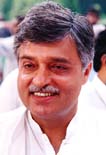 He stated
that though he had not been named as an accused, some papers had
chosen to give false and misleading headlines indicating his involvement
in the case. He attacked the prime minister's office for taking
undue interest because it pertained to the son of the prime minister.
He stated
that though he had not been named as an accused, some papers had
chosen to give false and misleading headlines indicating his involvement
in the case. He attacked the prime minister's office for taking
undue interest because it pertained to the son of the prime minister.
He protested against the transfer of the enforcement director
who, incidentally, was named as accused No 1 in the case. He also
criticised the handling over the case to the CBI which, according
to him, was unprecedented. He added, all these had been done to
save the interest of Ajeya Singh and as he put it 'because
all the enquiries made by the directorate of enforcement so far
indicate that such documents do exist and there is an account
to that effect.'
He concluded by saying that his name had
been dragged in the FIR by the prime minister's office by misusing
the government machinery. Later, when we were asked whether his
name figured in the FIR, we sent a reply saying his name did figure
in the FIR and that it was proposed to examine him regarding certain
facts at an appropriate stage.
As the case is perhaps still under investigation, no comments
can be made on Dhawan's speech. Nor on his involvement or otherwise.
Nor on the involvement of Captain Satish Sharma and others. Suffice
it to say here that soon after the registration of the case on
May 25, 1990, we proceeded with the investigation with speed.
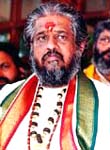 After examining a few witnesses available in India including Nanday
and some other public servants, we made a breakthrough in the
case and sent letters rogatory through the Delhi court to the
UK, the USA, Canada and St Kitts promptly. We were able to
collect good evidence from eyewitnesses on what transpired during
the stage-managed enquiries by Nanday.
After examining a few witnesses available in India including Nanday
and some other public servants, we made a breakthrough in the
case and sent letters rogatory through the Delhi court to the
UK, the USA, Canada and St Kitts promptly. We were able to
collect good evidence from eyewitnesses on what transpired during
the stage-managed enquiries by Nanday.
Our letters rogatory were
accepted by the US authorities for execution without any amendment.
When the stage came for examination of vital witnesses in the
United States, we made a specific request that our officers be
allowed to be present at the time of hearing of the letters rogatory.
We also requested for their examination on oath. The US department
of justice had sent us notes on the dramatis personae prepared
by them. They had already issued summons to some witnesses including
Dev Ketu.
On the day I received a call from Washington informing me
that the department of justice had been informed by
Dev Ketu's wife that he was in India. In the meantime, Chandra Shekhar
had become the prime minster. We checked up and learnt that Ketu had in
fact arrived and was moving around in Delhi introducing himself
as the health advisor to the prime minister. As soon as he got
scent of our coming to know about his presence in Delhi, he again
bolted.
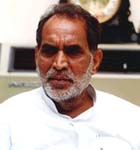 Soon after Chandra Shekhar took over as prime minister, Chandra Swami
returned to India. In fact, even before he arrived on November
25, 1990, he had secured an interim anticipatory bail (ex-parte)
from the Delhi high court which was confirmed on December 17, 1990.
Keeping in view these developments, it was necessary now to get
Chandra Swami through thorough investigations. He, however, would
not appear before the CBI for his examination, although a number
of notices giving firm dates were served on him.
Soon after Chandra Shekhar took over as prime minister, Chandra Swami
returned to India. In fact, even before he arrived on November
25, 1990, he had secured an interim anticipatory bail (ex-parte)
from the Delhi high court which was confirmed on December 17, 1990.
Keeping in view these developments, it was necessary now to get
Chandra Swami through thorough investigations. He, however, would
not appear before the CBI for his examination, although a number
of notices giving firm dates were served on him.
One evening,
we suddenly learnt that with the permission of the high court,
taken in another case, Chandra Swami was again going abroad even
before making himself available for examination in the St Kitts
case. He obviously was very keen to go the USA as some of those
involved in this case there had already received summons from
the US department of justice and were panicky. We thought his
going abroad at that juncture would seriously jeopardise the
investigation.
In fact, Dev Ketu had run away from India and gone
to the USA. We served that very evening a notice on Chandra Swami
not to leave India and to appear for examination next day. We
also simultaneously moved the Delhi high court to restrain him
from going abroad at the stage. We partially succeeded as the
high court issued a clear directive fixing a firm date for his appearance
before the CBI for examination in the St Kitts case.
But at this
stage, Chandra Swami got me shunted out to the BSF from the CBI.
We had written to the assurance committee of Parliament that investigation
in this case would be completed in a few months. In fact, the
investigation was at a very crucial stage when I was thrown out
of the CBI. The case is perhaps still gathering dust.
| 








